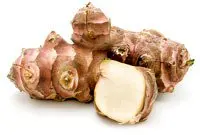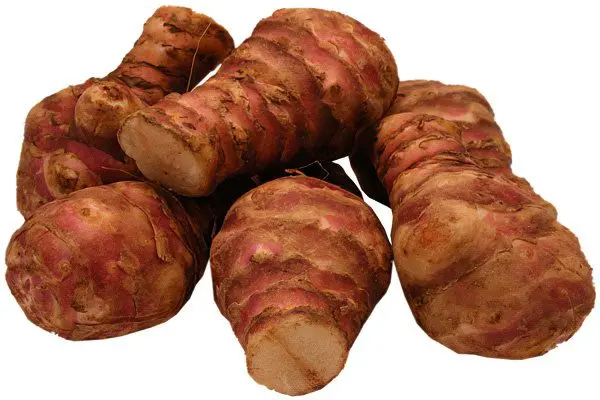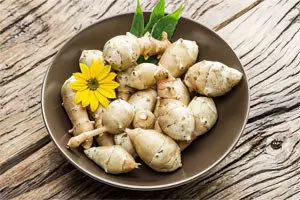Contents
- What does Jerusalem artichoke look like? What does it taste like?
- The benefits of Jerusalem artichoke
- Is it worth making juice from Jerusalem artichoke?
- What is useful tea from Jerusalem artichoke leaves?


Jerusalem artichoke (lat. – Helianthus tuberosus L) was brought to Europe from North America in the 17th century. The plant quickly spread and gained popularity due to its tasty tubers and medicinal properties. Throughout the history of cultivation, different peoples have endowed Jerusalem artichoke with a variety of names – this is a tuberous sunflower, and an earthen pear, and a Jerusalem root, and a boulevard.
Scientists drew attention to the healing properties of Jerusalem artichoke and organized a lot of research devoted to their study. As a result, it was possible to establish that active plant substances are able to lower blood sugar, control the level of total cholesterol and triglycerides. Inulin, which is found in high concentrations in Jerusalem artichoke, has a unique effect. Clinical studies have shown that inulin has pronounced prebiotic properties, is able to lower blood glucose parameters, regulate intestinal pH, ensuring full absorption of calcium. Inulin has been proven to have a positive effect on the lipid profile of plasma, an immunomodulatory effect on the lymphatic structure of the digestive organs.
As a dietary component, Jerusalem artichoke is effectively used in the complex therapy of obesity, type II diabetes mellitus. Recent studies have shown that substances contained in Jerusalem artichoke tubers have a cytotoxic effect on breast cancer cells. [1].
What does Jerusalem artichoke look like? What does it taste like?
How does it look? The root crop of Jerusalem artichoke is suitable for human consumption. Outwardly similar to ginger tubers. The stem is erect, rather strong, covered with fluff, somewhat branched at the top. The plant can grow up to three to four meters.

Taste. The root crop tastes like a cabbage stump or turnip. Fried fruits resemble sweet fried potatoes. If the Jerusalem artichoke rhizomes freeze, they have a sweet taste, because under the influence of low temperatures, inulin breaks down with the formation of fructose.
The benefits of Jerusalem artichoke
The healing properties of Jerusalem artichoke are explained by high concentrations of inulin. Its tubers contain from 14 to 20% of the total weight. Inulin – effectively restores the intestinal microflora, regardless of the origin of dysbacteriosis. Under its influence, beneficial bacteria multiply, restoring normal digestion.
The active sorption function of inulin is considered important. With its participation, the binding and elimination of toxins, ballast components that enter the body with food or are formed during digestion. Inulin, like a brush, cleans the thin villi of the inner epithelial layer of the intestine. Due to this, the villi do not stick together, but actively move, facilitating the absorption of nutrients.
Chemical composition
All the benefits of Jerusalem artichoke lies in its fruits. The calorie content of 100 g of the product is 73 kcal.
Calories 73 KKal
- Fats:
0 g
- Proteins:
2 g
- Carbohydrates:
17,5 g
- Water:
78 g
- Ash:
2,5 g
- Cellulose:
4,5 g
Vitamins (in 100 g): | Quantity | %RDN |
Vitamin B1 (thiamine) | 0,2 mg | 13% |
Vitamin B5 (pantothenic acid) | 0,4 mg | 8% |
Vitamin B3 (PP, nicotinic acid) | 1,3 mg | 7% |
Vitamin B4 (choline) | 30,0 mg | 6% |
Vitamin C (ascorbic acid) | 4,0 mg | 5% |
Minerals (in 100 g): | Quantity | %RDN |
Bor | 100 mcg | 143% |
Silicon | 8 mcg | 27% |
Chrome | 3,5-18 μg | 24% |
Vanadium | 9,7 mcg | 24% |
Hardware | 3,4 mg | 19% |
Nickel | 2,4-27 μg | 15% |
Molybdenum | 10 mcg | 14% |
Copper | 130 mcg | 14% |
Phosphorus | 78 mg | 10% |
potassium | 429 mg | 9% |
Full chemical composition ➤
Other important connections:
Phytosterols — 9 mg (16,4% of RDI)
Purine — 2 mg (2% of RDI)
Jerusalem artichoke contains inulin. This polymer of fructose is a carbohydrate. It helps to remove harmful compounds, heavy metals, radionuclides from the body. Inulin is useful for bone tissue, as it stimulates its growth, increases the activity of the immune system, cleanses the liver. Thanks to inulin, the digestive system functions better, lipid metabolism is accelerated.
Inulin is necessary for people suffering from diabetes, as it is a regulator of carbohydrate metabolism. Each Jerusalem artichoke tuber contains about 14-20% of inulin.

There is more iron in Jerusalem artichoke than in turnips, carrots, beets and potatoes. One tuber per day is enough to saturate the body with silicon. The fruits themselves do not contain selenium, but they contribute to its absorption by the body.
There are many organic acids in Jerusalem artichoke, they are represented by:
Succinic acid.
Malic acid.
Fumaric acid.
Malonic acid.
Their intake in the body helps to increase immunity, improves the functioning of the digestive tract, stimulates the production of saliva, bile, gastric juice and pancreatic enzymes. Organic acids have bactericidal properties.
Application in medicine
1 Restores the microflora in the intestines
Inulin, concentrated in Jerusalem artichoke roots, has prebiotic properties. It favorably affects the growth, reproduction and activity of bifidobacteria. Intestinal health is restored with the use of Jerusalem artichoke by restoring the activity of microflora [2].
2 Reduces constipation
The vegetable fiber of Jerusalem artichoke roots is effective in stool retention. In the course of medical observations, it was found that the introduction of Jerusalem artichoke into the diet contributes to an increase in the frequency of emptying, the formation of softer feces in adults. [3].
3 Reduces bad cholesterol and raises good
To study the effect of inulin on the lipid profile, a study was conducted involving 22 healthy men. The use of inulin-enriched foods contributed to a decrease in blood triglycerides by more than 22%. “Good” cholesterol at the same time increased by almost 36% [4]. A larger experiment with a group of 200 adults showed slightly different results. Total cholesterol decreased by almost 7%, and “bad” – by 10%. Positive effects on triglycerides and “good” cholesterol have not been confirmed [5].
4 Improves absorption of calcium and magnesium
The active compounds of Jerusalem artichoke stimulate the synthesis of fatty acids that can lower the pH level in the large intestine. The ongoing processes increase the solubility and absorption of calcium and magnesium. Several independent clinical studies in which 14 middle-aged women and 9 men, 13 young women and men and 59 adolescent girls took part showed that regular use of Jerusalem artichoke promotes better absorption of calcium. [6], [7]. Similar results were shown by a study of chicory. In 46 women with diagnosed diabetes mellitus, an increase in the concentration of calcium in the blood was found. [8].
5 Relieves inflammation in the intestines
Observation of 19 patients with ulcerative colitis led to the conclusion that Jerusalem artichoke alleviates signs of intestinal inflammation and stomach dysfunction [9].
6 Protects against bowel cancer
A medical experiment, which involved 37 patients with colon cancer and 43 patients after surgery for the removal of polyps in the large intestine, showed that Jerusalem artichoke reduces colorectal proliferation. At the same time, an increase in IFN-gamma was noted. After the removal of polyps, patients showed a decrease in the toxic effects of bacteria, a decrease in the marker of inflammation [10].
The use of Jerusalem artichoke in diabetes

In patients with type II diabetes mellitus, who use Jerusalem artichoke, a positive trend is recorded:
It decreases, and in most cases, the level of sugar in the blood normalizes. This is due to a decrease in the absorption of glucose, its more active assimilation. There is an increase in sensitivity to the action of insulin, due to a decrease in cell resistance. The pancreas actively synthesizes its own insulin, the liver – glycogen.
Fat metabolism is restored. There is a drop in cholesterol, triglycerides in the blood. This has a preventive effect on the development of atherosclerosis and the severe complications that it can entail.
Reduced weight in patients suffering from concomitant obesity.
The functions of the liver and digestive organs are normalized.
In one clinical study, 49 women with type II diabetes were regularly offered Jerusalem artichoke inulin. As a result, fasting blood sugar decreased by 8,5% and HbA1c by 10,4%. These data correspond to the average blood sugar content over the past three months of observation. [11]. It is noteworthy that with a decrease in blood glucose before and after a meal, it is accompanied by a decrease in insulin resistance and blood pressure parameters. This effect was documented in a study of 100 elderly diabetic patients. [12].
An analysis of the results of 20 studies involving more than 600 adults confirmed the trend towards normalization of sugar levels in type II diabetes [13].
How to use? People with confirmed diabetes mellitus or with a predisposition to it are recommended to take 1-3 teaspoons per day of a powder prepared from the pulp of Jerusalem artichoke roots with meals. The glycemic index of Jerusalem artichoke is 15, the calorie content per 100 g is 276 calories. Due to this, it does not provoke the formation of fatty deposits. All nutrients are used by the body to restore energy, normalize metabolic processes.
Jerusalem artichoke powder is recommended for debilitated patients, patients in the recovery period after an illness, women during lactation, people who want to receive more nutrients and valuable plant components.
Jerusalem artichoke for weight loss

Jerusalem artichoke helps in the fight against excess weight. This effect has been proven during experimental programs, clinical trials. It was possible to establish that the systematic use of Jerusalem artichoke for a certain time significantly activates the metabolism of fats and carbohydrates, normalizes the level of insulin and its absorption by body cells. Complex physiological processes as a result contribute to the loss of extra pounds.
Jerusalem artichoke is able to suppress the feeling of hunger, regulate eating behavior, suppressing appetite. Observation of 40 women proved that the morning intake of 100 grams of Jerusalem artichoke every day for a week reduces appetite, leads to a decrease in the required portions of food. [14].
Clinical observations have also been made in patients with prediabetes. For example, 44 participants were offered 100 g of Jerusalem artichoke daily for 18 weeks. As a result, these subjects lost more weight than those who took the more traditional plant fiber. [15].
Of course, Jerusalem artichoke will not miraculously get rid of 20 extra pounds in a couple of weeks. A diet with its use is a systematic, regular work that builds a completely new mechanism of metabolism in the body. Jerusalem artichoke gets rid of those deposits that have formed as a result of insulin binding to cell membranes. To achieve the best result, you should combine several methods of losing weight.
Is it worth making juice from Jerusalem artichoke?

All the useful properties of the root crop are preserved in the juice. The use of juice has a complex effect on the body:
Diuretic.
Hypotensive.
Cholagogue.
Laxative.
Antitumor.
Fortifying.
Antiulcer.
Freshly squeezed Jerusalem artichoke juice is used both for therapeutic and prophylactic purposes:
To remove toxins from the body.
Improvement of the blood count.
Renewal of hepatic tissues.
Activation of protective functions.
To reduce the likelihood of developing tumors.
Blood sugar control.
To normalize the functions of the gastrointestinal tract.
How much can you drink per day? It is recommended to consume ½ cup of fresh juice twice a day 15-30 minutes before meals or after meals.
A course of treatment. Course intake of juice is from 10 days to 1 month. Then within 14 days they take a break and drink again. The duration of drinking juice for medicinal purposes depends on what goal you are pursuing, what result you want to get.
How to store? After preparation, the juice is poured into a bottle with a ground, tight lid. Store in the refrigerator for up to 4 days.
How to take with diabetes? Jerusalem artichoke juice is characterized by a low glycemic index, which contributes to the slow breakdown of glucose. It is able to activate metabolism, lower blood sugar, improve general condition. The optimal time of admission is twice a day before meals. The recommended amount per dose is 50 ml.
What is useful tea from Jerusalem artichoke leaves?
A hot drink made from Jerusalem artichoke leaves is an excellent remedy. It restores immunity, improves tone, strengthens the body, helps to maintain health. If you try it once, it will become one of the favorite drinks of the whole family.
[Video] Recipe for Fermented Jerusalem Artichoke Leaf Tea:









